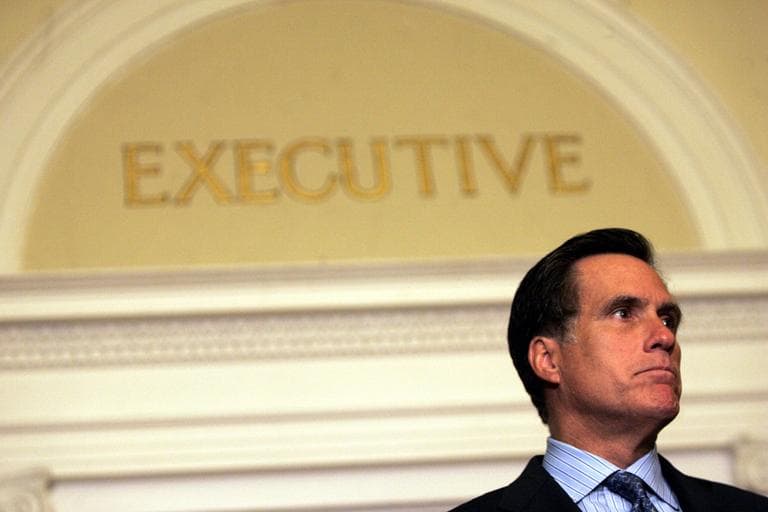Advertisement
Romney As Executive: Big Dig Crisis Management
ResumeThe final entry of a six-part series

BOSTON - On July 11, 2006, Boston area residents woke up to shocking news.
A concrete slab had killed 38-year-old Milena Del Valle and injured her husband, Angel, after it fell from the I-90 connector tunnel onto their car. Drivers were terrified.
Although Turnpike Authority Chairman Matt Amorello called it an "anomaly," anxiety about the tunnels spiked. In response, Gov. Mitt Romney came home from vacation in New Hampshire and went right to work.
Tom Trimarco, then secretary of administration and finance, says Romney “thrives” on problem solving.
[sidebar]
WBUR traces our state's long connection to the GOP presidential candidate. A six-part series:
- 11/22: Romney's Harvard Years: An Earnest Traditionalist
- 11/30: Romney's Bain Years: Turnaround Specialist-In-Chief
- 12/6: At Belmont Temple, Romney Was An Influential Leader
- 12/15: Romney's Jobs Record As Governor Is Up For Debate
- 12/20: Analyzing Romney's Leadership On Health Care
- 12/27: Romney As Executive: Big Dig Crisis Management
Timeline: Mitt Romney's life and career
Related: WBUR's complete Election 2012 coverage
[/sidebar]
Trimarco and Romney attended a two-hour briefing with the Turnpike Authority's lead engineer and later that day Romney spoke to reporters, saying that the public should not drive through turnpike tunnels "with their fingers crossed.”
Mary Connaughton was a member of the turnpike board at the time and she says Romney sized up exactly what the public needed.
“They wanted someone with an independent view of this to make sure that the tunnels were indeed safe,” Connaughton says.
Romney called for the turnpike chair to step down. Within 72 hours he passed emergency legislation to get control of inspecting the Big Dig.
He personally called forensic engineering firms to get them interested in the investigation. And he made sure his man in charge of the audit reported directly to him. Romney remained the public face of the investigation. He gave regular Powerpoint presentations to the press and looked like the lead engineer and CEO.
“My first thought was that he seized the photo opportunity moment,” the Boston Globe’s Joan Vennochi says. Vennochi questions his character as a leader.
“Whether he ever held himself accountable for what led up to what had happened. No. I don't think he did that,” she says.
Instead, Vennochi says Romney shifted all the blame to the man running the Big Dig in that moment.
“[Romney] chose to focus on one person — Matt Amorello — who was someone he had not appointed,” Vennochi explains. “And he was the scapegoat for everything bad that had happened.”
Another problem was that Romney had promised to take control of the Turnpike Authority during his gubernatorial campaign. Once he was in office, Romney tried to remove Amorello from his job as chairman.
But according to Trimarco, Romney ran into trouble with legislative leaders who supported Amorello. These were the same leaders he would need on his side to pass major health care reform. According to Trimarco, Romney made a political calculation.
“He needed to work closely with the Senate president and the speaker on that issue,” Trimarco says. “And they agreed to disagree on Amorello and the governor backed off.”
Romney wouldn't talk to us about this story. But back in 2006, while he briefed reporters on safety in the Big Dig, Romney took several questions about why he hadn't taken over the Big Dig sooner, like he promised. Romney blamed the Legislature.
“The problem was — and you know this — the State House didn't want me to get control,” Romney said.
Some people still don't buy it. Christy Mihos was an outspoken member of the Turnpike Authority board. He ran for governor as an independent and then as a Republican in 2010. He says he brought information about safety problems to the governor and Romney dismissed them.
“Mitt always had intentional indifference to the Turnpike Authority's issues and the Big Dig's problems,” Mihos says. “But he had a front seat to all of this and just chose to do nothing.”
Mihos says there were other ways to get control of the Big Dig. Romney could have cut off money to the project, which we controlled. But that may have also compromised Romney's relationship with Beacon Hill lawmakers.